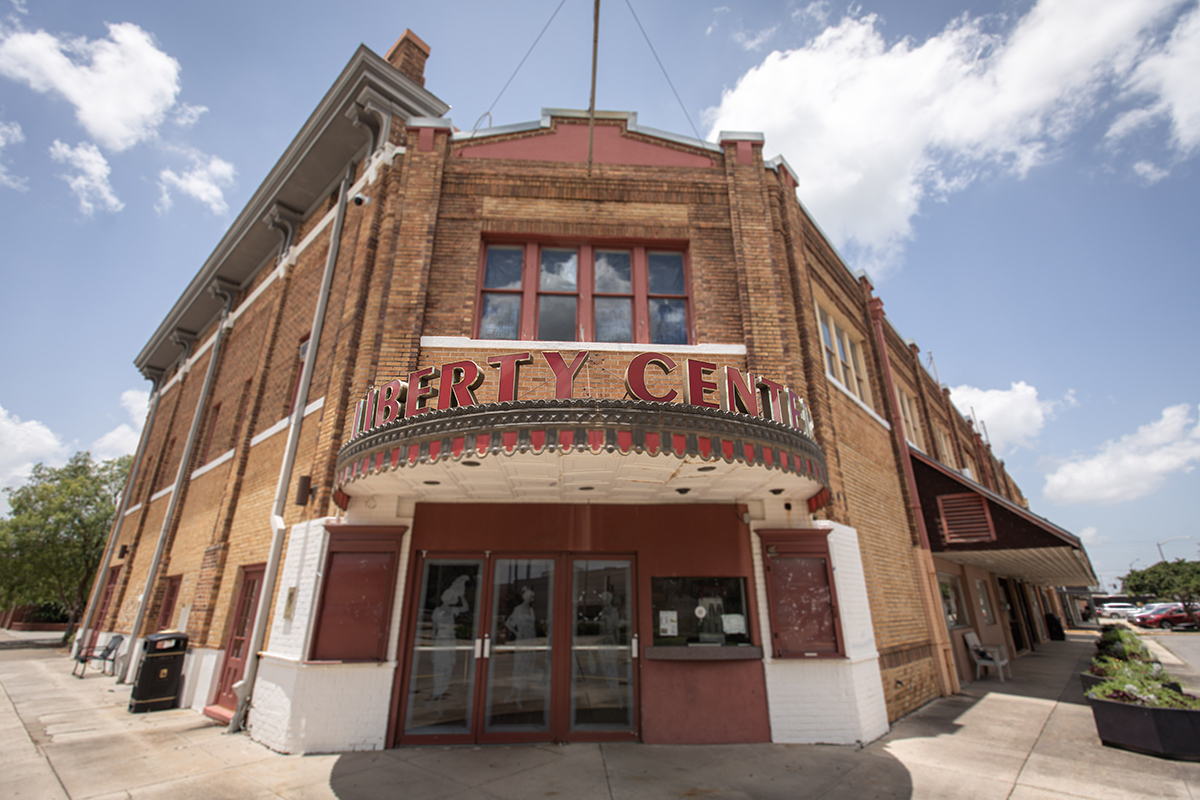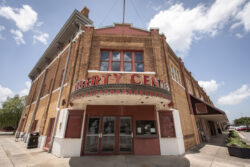Liberty Theatre
The historic theater in Eunice entertained generations as a movie theater, vaudeville house, and home of Rendez-vous des Cajuns.

The Louisiana Endowment for the Humanities
The entrance to Liberty Theatre in Eunice, 2020. Brian Pavlich, photographer.
Billed as a “Temple of Amusement,” the Liberty Theatre in Eunice opened on July 19, 1924. For most of the one hundred years that followed, the building has been a landmark in the Cajun prairie city situated in both Acadia and St. Landry Parishes. Built for silent film screenings and vaudeville shows, the theater began its transition to a performing arts venue following a grassroots renovation in 1982 by the Society for the Preservation of Ethnic Culture in Acadian Louisiana. Since 1987 it’s been best known for hosting Rendez-vous des Cajuns, a Cajun-French hybrid of Nashville’s Grand Ole Opry and A Prairie Home Companion.
Construction on the Liberty Theatre began in 1919 but stopped during the financial crisis of 1920 and depression of 1921. Work resumed in 1924, just months before the theater’s grand opening. Eunice’s New Era newspaper predicted “the theatre will move up in the front ranks of the larger theatres of the state…take into consideration the value of such an amusement rendez-vous for a town of this size.”
Because two theaters named Liberty had previously operated in Eunice, J. Claude Keller and A. F. McGee named their joint venture the New Liberty Theatre. Its one thousand seats included a large balcony, the New Era reported, one side of it reserved for white people, and the other “for colored.” Electric lights, a “typhoon cooling” system, and restrooms for men and women were among the theater’s amenities.
In 1924 opening-day attractions at the Liberty included an Our Gang comedy for children in the morning and an afternoon screening of the melodrama Lilies of the Field. The similarly sensationalist The Eternal Three and Scars of Jealousy were among the coming attractions. With a stage measuring fifty-two feet high, forty feet wide and twenty-five feet deep, the venue also accommodated opera, musical comedies, and vaudeville shows.
The Liberty presented its first talking picture on March 3, 1929. Ten cents admission brought patrons a screening of the crime drama The Bellamy Trial plus vaudeville acts and musical performances. Generations of the Keller family operated the Liberty. By the 1950s the Keller’s children, Rosemary Herrod and J. C. Keller Jr., were co-managing the business.
Sharing the fate of thousands of downtown movie theaters in the 1970s and ’80s, the Liberty closed on January 3, 1982. Cajun musician and accordion maker Marc Savoy, and Eunice’s mayor, Curtis Joubert, were soon spearheaded its reopening. “We had this old empty theatre right across the street [from the mayor’s office],” Joubert recalled. “And we had all these legendary musicians around here, but all they used to do was go play overseas and then come back and put their fiddles and guitars and accordions under the bed. We came up with the idea of putting them on the [Liberty] stage.”
The City of Eunice purchased the theater in 1986. The following year saw the debut of the soon to be world-famous Rendez-vous des Cajuns. Cajun musician and historian Ann Allen Savoy booked the show’s first fifteen years of performances, usually programming a Cajun band, a zydeco or Creole band, and a humorist, cook, or craftsperson every Saturday night. Rendez-vous des Cajuns played a major role in the Cajun cultural renaissance. Barry Jean Ancelet, a professor of francophone studies and a folklorist at the University of Louisiana at Lafayette, emceed the program during its first twenty-four years. “It was a showcase, a statement about who we are,” Ancelet said.
Saturday night performances continued until 2020, when the coronavirus pandemic and a malfunctioning heating, ventilation, and air-conditioning system forced the Liberty to close. But the first year of the pandemic also saw Marc and Ann Savoy’s son, Cajun musician and recording studio owner Joel Savoy, and other concerned citizens form the Association for the Liberty Theatre of Eunice. In anticipation of the theater’s one hundredth anniversary in 2024, the nonprofit organization worked to ensure the theater’s second resurrection. In 2021 and 2022, the association obtained local funding, federal grants, private donations, and a grant from the National Trust for Historic Preservation.
